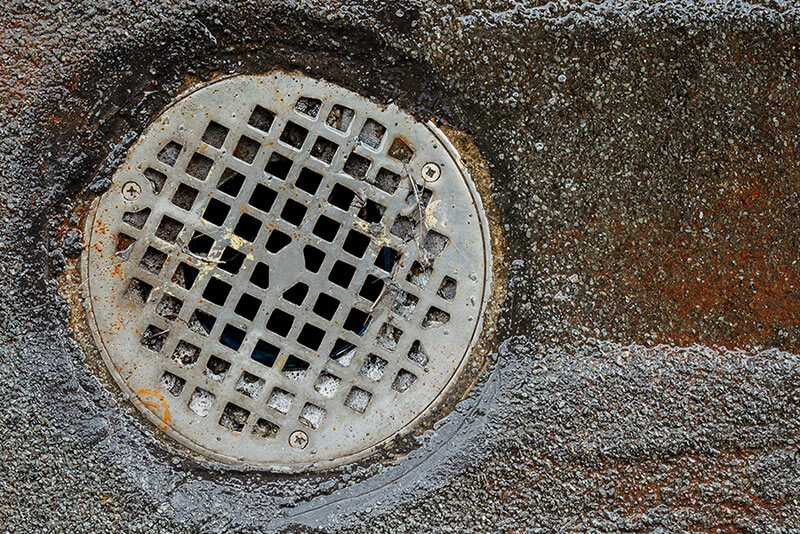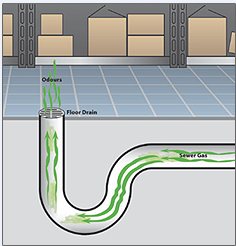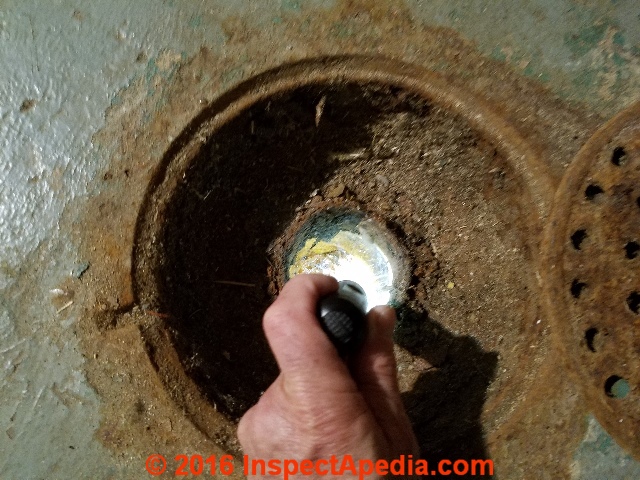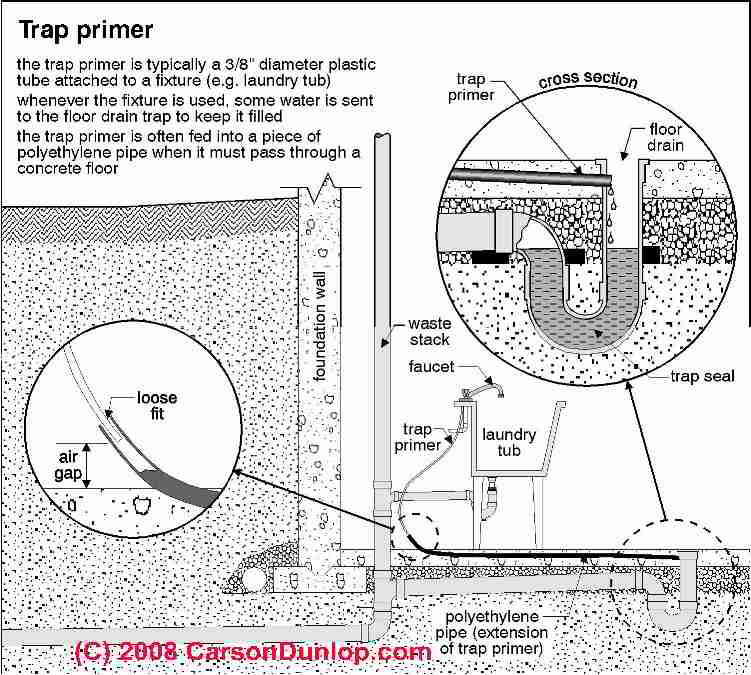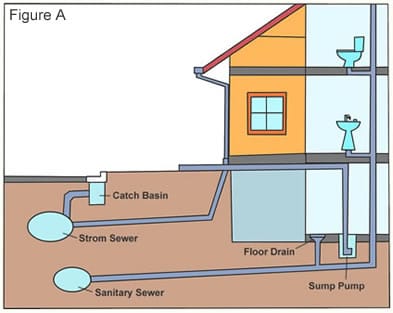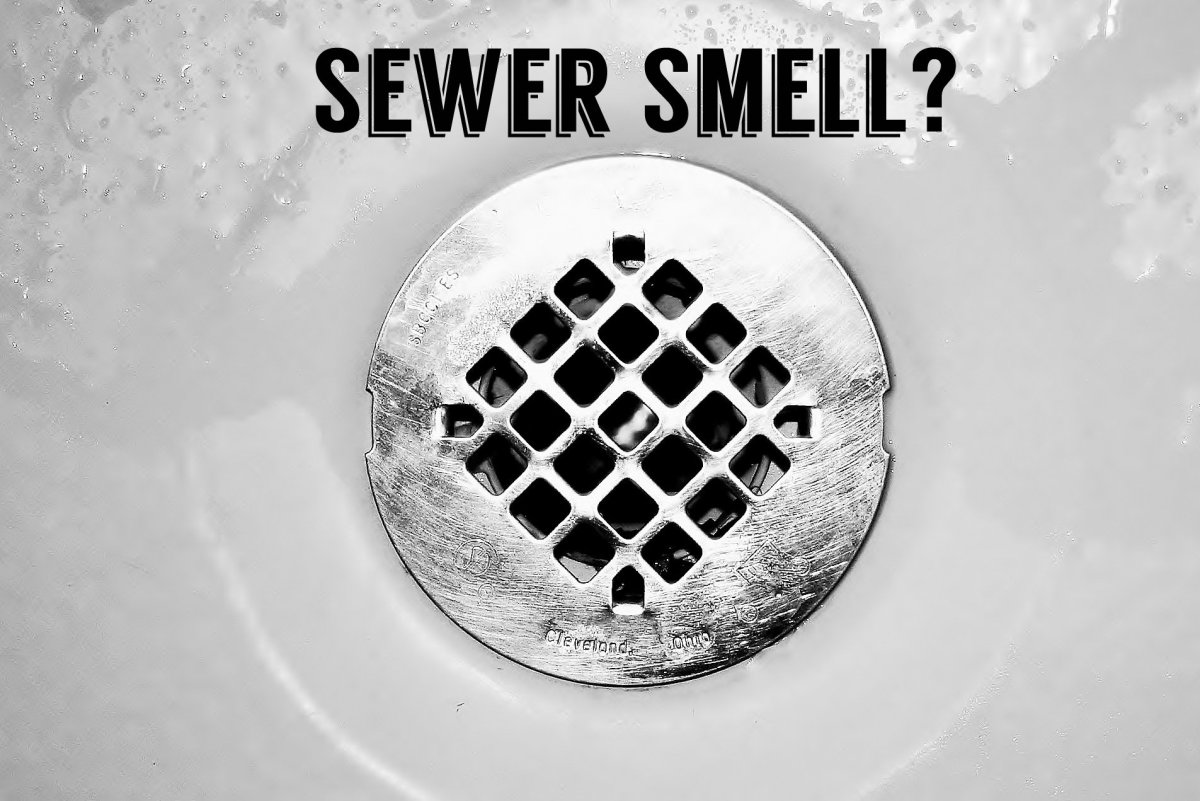Understanding the Causes of Sewer Gas Smell in Basement Floor Drains
Having a sewer gas smell emanating from your basement floor drain can be unpleasant and concerning. Understanding the causes behind this issue is the first step towards effectively addressing and resolving it. Let’s discuss the common reasons why sewer gas smells occur in basement floor drains.
- Damaged or Broken Sewer Pipes: One of the primary causes of sewer gas smell in basement floor drains is damaged or broken sewer pipes. Over time, pipes can deteriorate, develop cracks, or even collapse, allowing sewer gas to escape into your basement. This can happen due to various factors such as age, shifting soil, tree root intrusion, or poor installation. Identifying and repairing damaged sewer pipes is crucial to eliminate the sewer gas smell.
- Dry Floor Drain Trap: Another common cause of sewer gas smell in basement floor drains is a dry floor drain trap. The floor drain trap is a U-shaped pipe that holds water to create a barrier between your living space and the sewer system, preventing sewer gas from entering your home. If the floor drain trap dries out, it loses its effectiveness, allowing sewer gas to infiltrate your basement. Pouring water into the floor drain to refill the trap can help solve this issue.
- Blocked or Clogged Drainage System: A blocked or clogged drainage system can also lead to sewer gas smells in your basement. When debris, dirt, or other materials accumulate in your drainage system, it can obstruct the flow of water, causing backups and potentially forcing sewer gas back into your basement through the floor drain. Regular maintenance, such as clearing debris and cleaning the drainage system, can prevent blockages and subsequent sewer gas smells.
- Improper Ventilation: Inadequate or improper ventilation is another factor that can contribute to sewer gas smells in your basement. Proper ventilation systems play a crucial role in maintaining the air quality and preventing the buildup of sewer gas. If your basement lacks proper ventilation or if the existing ventilation system is not functioning correctly, sewer gas smells may occur. Ensuring proper ventilation and making necessary repairs or upgrades can help eliminate these odors.
- Sewer Line Break or Backflow: In some cases, a sewer line break or backflow can be the cause of sewer gas smells in your basement. A break in the main sewer line or a backflow issue can result in sewer gas escaping into your basement through the floor drain. These situations often require immediate attention from a professional plumber to assess and repair the sewer line, ensuring the safety and cleanliness of your basement.
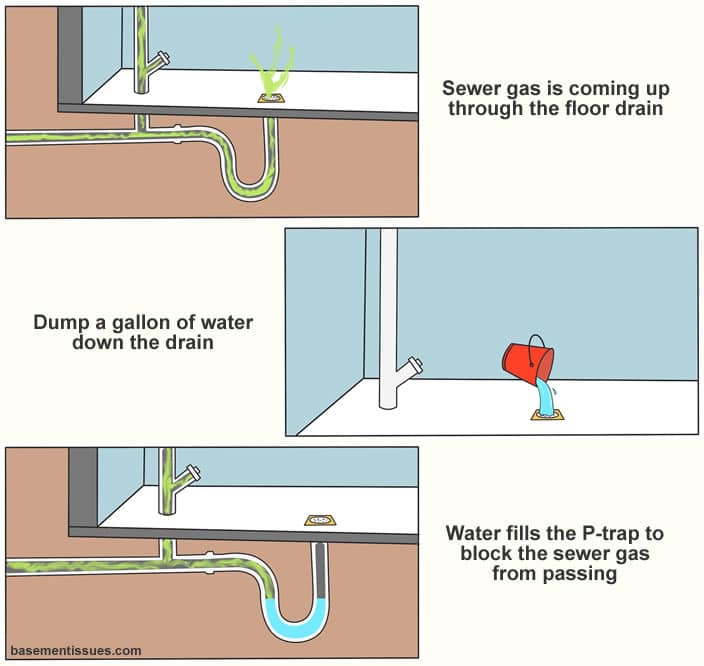
How to Identify and Diagnose Sewer Gas Smell in Your Basement
If you notice a foul sewer gas smell in your basement, it’s crucial to identify and diagnose the source of the odor. By doing so, you can take appropriate measures to address the issue and eliminate the unpleasant smell. We will discuss how to identify and diagnose sewer gas smells in your basement.
Locate the Source: The first step in identifying and diagnosing sewer gas smells in your basement is to locate the source of the odor. Begin by carefully inspecting the area around the basement floor drain. Check for any visible signs of damage, cracks, or gaps in the drainpipe or floor drain cover. Additionally, examine other nearby plumbing fixtures, such as sinks or toilets, as they may also contribute to the odor.
Check the Floor Drain Trap: A dry floor drain trap is a common cause of sewer gas smells. To check if the floor drain trap is dry, pour a small amount of water into the drain. If the water quickly drains away or if you do not hear the sound of water flowing into the trap, it may indicate that the trap is dry or not functioning correctly. Refilling the trap with water should help prevent sewer gas from escaping through the drain.
Inspect the Ventilation System: Inspect the ventilation system in your basement to ensure it is functioning correctly. A blocked or improperly installed ventilation system can contribute to sewer gas smells. Check if the ventilation pipes are clear of obstructions, such as debris or bird nests. Additionally, make sure that the ventilation pipes are properly connected to the sewer system and vented outside the building.
Look for Signs of Leaks or Backups: Leaks or backups in the plumbing system can also cause sewer gas smells in your basement. Inspect the area for signs of water leaks, such as dampness, water stains, or mold growth. Additionally, check for any signs of sewer backups, such as slow draining sinks or toilets, gurgling sounds in the plumbing, or water pooling near the floor drain. These signs may indicate a more significant issue that requires professional attention.
Consider the Age of the Sewer System: The age of your sewer system can also play a role in sewer gas smells. Older systems may be more prone to leaks, cracks, or deteriorating pipes, allowing sewer gas to escape into your basement. If your home has an older sewer system, it may be beneficial to have it inspected by a professional plumber to identify any potential issues and ensure its proper functioning.
Effective Techniques for Eliminating Sewer Gas Odor from Basement Floor Drains
Dealing with a sewer gas odor in your basement can be unpleasant and concerning. However, there are effective techniques you can employ to eliminate the smell and restore a fresh and clean environment. Below are some proven techniques for eliminating sewer gas odor from basement floor drains.
Clean and Deodorize the Floor Drain: Start by thoroughly cleaning the floor drain to remove any buildup of debris, dirt, or sludge that may contribute to the sewer gas odor. Use a plumbing brush or a wire brush to scrub the inside of the drainpipe and remove any residues. After cleaning, rinse the drain with hot water. Then, deodorize the drain by pouring a mixture of equal parts baking soda and vinegar down the drain. Let it sit for about 30 minutes before rinsing with hot water again.
Flush the Drain with Hot Water: Flushing the floor drain with hot water can help dislodge any remaining debris and flush out the sewer gas odor. Carefully pour a large pot or kettle of boiling water down the drain. This hot water will help break down any organic matter and eliminate unpleasant odors. Repeat this process periodically to maintain a clean and odor-free drain.
Use a Drain Trap Primer: A drain trap primer is a device that automatically adds water to the floor drain trap to keep it filled and prevent sewer gas from entering your basement. Install a drain trap primer on the floor drain to ensure that the trap remains properly sealed and functional. This will help prevent the escape of sewer gas and eliminate the associated odor.
Install a Backflow Preventer: A backflow preventer is a device that prevents sewage from flowing back into your basement. Installing a backflow preventer on the floor drain can help eliminate sewer gas odors by stopping any potential backflow of sewer gases into your basement. This device acts as a barrier, ensuring that gases flow in the intended direction, away from your living space.
Consider Professional Drain Cleaning Services: If the sewer gas odor persists despite your efforts, it may be necessary to seek professional drain cleaning services. A professional plumber can use specialized equipment, such as drain snakes or hydro-jetting, to thoroughly clean the drain and remove any stubborn blockages or buildup. This deep cleaning can effectively eliminate the sewer gas odor and restore proper drainage.
Preventing Future Sewer Gas Smell Issues in Your Basement
Experiencing sewer gas smells in your basement can be a frustrating and unpleasant situation. However, by implementing preventive measures, you can avoid future occurrences of sewer gas smells and maintain a fresh and odor-free basement. Here are some effective preventive measures to help you prevent future sewer gas smell issues in your basement.
Ensure Proper Floor Drain Trap Maintenance: Regular maintenance of the floor drain trap is essential in preventing sewer gas smells. Make it a habit to pour water down the floor drain regularly to keep the trap filled. This water barrier acts as a seal, preventing sewer gas from entering your basement. If you have floor drains that are not frequently used, such as in a basement bathroom, consider pouring water into them at least once a month to maintain the trap’s effectiveness.
Practice Good Plumbing Habits: Proper plumbing habits can go a long way in preventing sewer gas smells. Avoid pouring grease, oils, or other substances that can solidify and clog the drainage system down the sink or toilet. Use drain screens or strainers to catch debris and prevent it from entering the plumbing system. Additionally, avoid flushing non-flushable items down the toilet, as they can cause blockages and backups.
Regularly Inspect and Maintain Your Sewer System: Schedule regular inspections of your sewer system to identify and address any potential issues before they escalate. Hire a professional plumber to perform a thorough inspection of your sewer pipes, checking for signs of damage, leaks, or blockages. Regular maintenance, such as clearing tree roots, can also help prevent sewer line issues that may lead to sewer gas smells in your basement.
Improve Ventilation in Your Basement: Proper ventilation is crucial in preventing the buildup of sewer gas odors in your basement. Ensure that your basement is adequately ventilated by installing vents or exhaust fans. These ventilation systems will help circulate fresh air and remove any stagnant air that may harbor unpleasant odors. Additionally, ensure that any existing ventilation systems are functioning correctly and free from obstructions.
Consider Sewer Line Backflow Prevention Devices: Installing sewer line backflow prevention devices can provide an additional layer of protection against sewer gas smells. These devices are designed to prevent sewer water or gas from flowing back into your basement in the event of a sewer line backup or flooding. Consult with a professional plumber to determine if installing backflow prevention devices is necessary based on your specific circumstances.
When to Seek Professional Help for Persistent Sewer Gas Odors in Your Basement
While there are preventive measures and techniques you can employ to address sewer gas odors in your basement, there may be instances where the problem persists despite your best efforts. In such cases, it is important to know when to seek professional help. Let’s discuss when it is appropriate to consult a professional for persistent sewer gas odors in your basement.
Continual and Strong Odors: If you have tried various methods to eliminate sewer gas odors in your basement, but the smell persists and is particularly strong, it is advisable to seek professional assistance. A professional plumber or odor specialist can conduct a thorough inspection to identify the source of the odor and provide appropriate solutions. Strong and persistent odors may indicate a more significant issue that requires professional expertise to resolve.
Complex Plumbing System Concerns: If your basement has a complex plumbing system, with multiple drains, pipes, and fixtures, and you are unable to pinpoint the source of the sewer gas odor, it is recommended to consult a professional. They have the necessary knowledge and tools to conduct a detailed assessment of your plumbing system, identify any underlying issues, and provide effective solutions to eliminate the odor.
Backups or Slow Drains: If you experience frequent backups or slow drains in your basement, along with sewer gas odors, it is a sign of a more serious plumbing issue. This could indicate a blockage or damage in the sewer line, causing sewer gas to escape into your basement. Professional assistance is crucial in diagnosing and resolving these problems to ensure the proper functioning of your plumbing system and eliminate odors.
Safety Concerns: If you have concerns about the safety of your basement environment due to sewer gas odors, it is essential to seek professional help immediately. Sewer gas contains toxic and potentially harmful gases, such as methane and hydrogen sulfide, which can pose health risks if inhaled in high concentrations. A professional plumber will assess the situation, identify any safety hazards, and take the necessary steps to mitigate the risks and eliminate the odors.
Unresolved Issues: If you have attempted various DIY methods to address the sewer gas odors in your basement, but the problem persists without improvement, it is time to involve a professional. They have the expertise and experience to identify the underlying cause of the odor and provide effective solutions. Continuing to tackle the issue on your own without success may lead to further complications and potential damage to your plumbing system.
Floor Drain Odor Diagnosis & Cure
Floor Drain Sewage Odor Problems: Cause & Cure
Laundry Room Floor Drain Smells – Basement Issues and Problems
Bad Smell in the House Sewer smell in bathroom, Smelly bathroom
drain waste vent – Sewer smell in basement – missing venting or
Sewer gas smell in basement
Bad Smell in the House The Family Handyman
Smell Sewer Gas in Your House? Try This DIY Remedy Before Calling
Related Posts:
- Best Flooring For Uneven Basement Floor
- Basement Flooring Options DIY
- How To Unclog Basement Floor Drain Video
- One Floor House Plans With Walkout Basement
- How To Level Concrete Basement Floor
- Small Basement Apartment Floor Plans
- Water Coming Up From Cracks In Basement Floor
- Best Flooring For The Basement
- Best Concrete Basement Floor Sealer
- Rambler Floor Plans With Basement Mn

